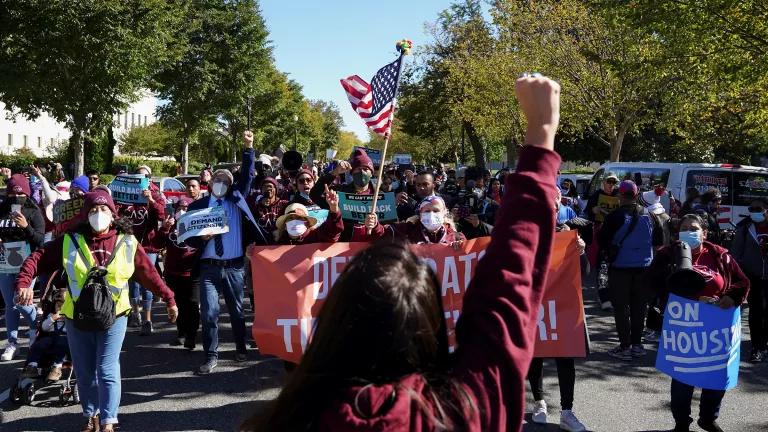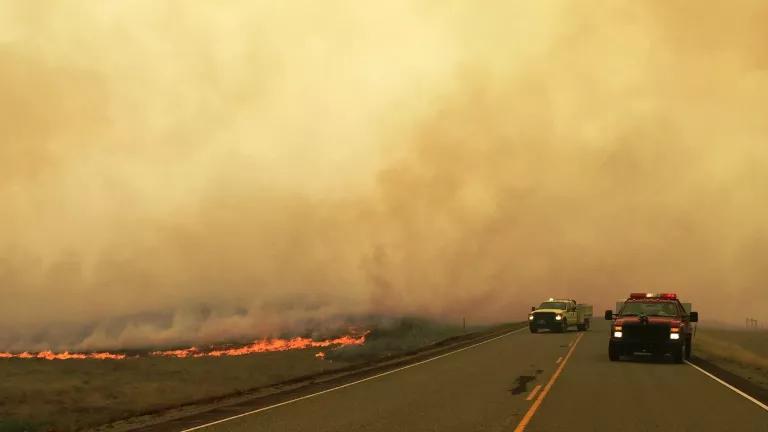Translating Joe Biden's Climate Vision into Action
NRDC experts take a deep dive into President-elect Joe Biden’s key plans to address climate change—the strongest national climate agenda ever laid out by a U.S. president-elect.

NRDC experts have dug into President-elect Joe Biden’s key plans to address climate change and produced a series of analytical blogs about what they entail, offering some proposals for strengthening them and outlining their potential impact on our imperiled people and planet.
NRDC President and CEO Gina McCarthy kicked off this series with her blog, In Biden’s Win, a Unifying Call for Bold Action on Climate, writing in part, “With climate change front and center on the ballot for the first time, Joe Biden and Kamala Harris sounded a clarion call for progress, laying out the strongest national plan ever to confront this widening crisis.”
Biden’s assertive plan puts climate action at the forefront of his administration’s agenda and addresses environmental justice and health, defense of nature and protection of biodiversity, and reducing fossil fuels—topics among those analyzed in the blogs below.
Excerpts:
In "Ensuring Environmental Justice and Health Protection," Erik Olson, Mae Wu, and Melissa Lin Perrella write that Biden has pledged to restore science to its rightful role, install new air and water monitoring, partner with people in fenceline communities, crack down on polluters and direct 40 percent investment in clean energy and transit, sustainable housing, training, workforce development, and cleanup of legacy pollution towards communities of color and low-income communities. To accomplish these goals, they write, Biden should take immediate action to address the Covid-19 pandemic and its fallout on vulnerable communities, address environmental justice and the health crisis, and invest in infrastructure and job creation.
“The Biden Administration should seize this important opportunity to ambitiously overhaul protections for environmental justice and health. Now is the time to take bold action to attack both the public health crisis and the racial and environmental injustices that have accumulated for generations.”
In “Biden's Defense of Nature Protects Climate and Biodiversity,” Anthony Swift and Lisa Suatoni write:
“The incoming Biden Administration should hit the ground running on maximizing nature’s value to fight and resist climate change. On day one, President-elect Biden should fulfill his pledge to put America on the path of protecting 30 percent of its lands and waters and oceans by 2030 through an executive order that adopts this 30x30 goal and creates a task force to develop an action plan that agencies (with key roles for the Departments of the Interior and State, as well as the National Oceanic and Atmospheric Administration and the U.S. Forest Service) can implement to protect important areas of America’s natural heritage.
“Multiple federal agencies, states, tribes, and local and affected stakeholder communities, along with our international neighbors, need to be able to meaningfully participate in the plan’s development. And, to ensure that the United States can meet the target through robust protections of ecologically representative areas within nine years, the work must get off the ground immediately, with the plan completed roughly a year after the order is issued.”
In “Biden’s Climate Plan Can Extract Us from Fossil Fuel Use,” Bobby McEnaney and Joshua Axelrod write:
“After four lost years in the wilderness, ignoring and undermining climate science, the United States will have an administration more committed to addressing climate change than any before. But for the United States to fully realize such a vision, much needs to be done to address the outsized role that this country plays regarding the extraction of fossil fuels.
“Action is required across our government agencies that help the U.S. economy tick and our general society function. The government-facilitated leasing of shared public lands and waters for oil and gas development must be phased out. The financial institutions that invest in and ensure fossil fuel infrastructure (like pipelines, plastics manufacturing facilities, and power plants) need to recognize their profound role in enabling climate change. And those tasked with protecting human health and well-being must confront the pollution associated with extraction that devastates communities and wildlands.”
This expert-written blog series includes:
- In Biden’s Win, a Unifying Call for Bold Action on Climate by Gina McCarthy
- The Biden Administration Will Boost Global Climate Action by Brendan Guy
- Biden to Engage Farmers & Build Climate Resilience by Allison Johnson and Claire O’Connor
- Biden Plan Promises Better Buildings, for Climate and Equity by Lauren Urbanek and Khalil Shahyd
- How President Biden Can Clean Up the Power Sector by David Doniger and Ben Longstreth
- Biden Promises Climate-forward, Equitable Transportation by Ann Shikany and Luke Tonachel
- Biden's Defense of Nature Protects Climate and Biodiversity by Anthony Swift and Lisa Suatoni
- Biden’s Climate Plan Can Extract Us from Fossil Fuel Use by Bobby McEnaney and Joshua Axelrod
- Ensuring Environmental Justice and Health Protection by Erik D. Olson, Mae Wu, and Melissa Lin Perella














